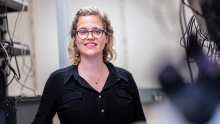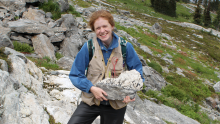Carl Hansen, UBC Physics and Astronomy professor and member of the Center for High-Throughput Biology, is one of several UBC researchers who have received $4.5 million in federal support for multidisciplinary initiatives that combine science, engineering and medical expertise.
Carl Hansen has received $965,950 to continue his research on increasing the speed and sensitivity of DNA analysis through microengineering. Other projects include new antibacterial surface coatings for medical devices, a better cure for liver cancer and 3D imaging for surgical procedures.
The seven UBC grants are part of an investment announced today by Gary Goodyear, Minister of State (Science and Technology) at McGill University for initiatives leading to health improvements and health-related economic benefits.
Minister Goodyear announced 37 grants totaling more than $19 million from NSERC’s Collaborative Health Research Projects program (CHRP). Jointly funded by the Natural Sciences and Engineering Research Council of Canada (NSERC) and the Canadian Institutes of Health Research (CIHR), the CHRP program encourages collaboration between researchers from natural sciences or engineering and health sciences.
“The federal government’s investment in these cross-disciplinary research projects will tangibly improve the health and quality of life of Canadians,” says Dr. John Hepburn, UBC Vice President Research and International. “This public support for science and technology research allows UBC researchers to continue to address important societal challenges that affect us all.”
Background
UBC recipients for the 2012 CHRP awards are:
Carl Hansen ($965,950), associate professor in the Dept. of Physics and Astronomy and member of the Center for High-Throughput Biology, is using microengineering approaches to increase the speed and sensitivity of DNA analysis. These new technologies, which will enable the genomic analysis of large numbers of single cells, are being used to better understand the biology of stem cells and cancer cells, ultimately leading to their manipulation for improved therapies.
Purang Abolmaesumi ($418,700), a Canada Research Chair in Biomedical Engineering and associate professor in the Dept. of Electrical and Computer Engineering, is working on a 3D ultrasound imaging system for wrist fracture operations. In North America, 90 per cent of the 300,000 cases each year involve the scaphoid, a small, cashew-shaped bone. Real-time, ultrasound imaging would allow surgeons to more accurately guide the screw required to treat scaphoid fractures. Reducing reliance on X-rays for this delicate procedure would also mean less radiation exposure for patients and surgical teams.
François Bénard ($840,158), professor of radiology at the Faculty of Medicine and a researcher at the BC Cancer Agency, aims to refine radiometals produced by liquid targets for molecular imaging of breast cancer. This will help physicians clarify whether a drug target is present in patients’ tumours before selecting expensive treatment.
Mu Chiao (($591,281), associate professor in the Dept. of Mechanical Engineering, has developed a drug delivery system that can be implanted behind the eye to treat retinal damage caused by diabetes. The implant can be activated by a magnetic field for on-demand release of a controlled drug dosage. In contrast, current treatments such as laser or anti-cancer drugs have serious side effects that include blindness.
Sidney Fels ($511,000), professor of electrical and computer engineering, is working on 3D computer modeling for the face and jaw to optimize head and neck surgery. The biomechanical modeling of the person’s upper and oral airways, mastication and swallowing will help in the simulation and design of surgery, surgical guides, prostheses and implant installation.
Urs Hafeli ($568,728), associate professor at the Faculty of Pharmaceutical Sciences, is working on a better cure for liver cancer. He is designing radioactive particles that can be monitored in how well they target and kill tumour cells while sparing healthy tissue.
Jayachandran Kizhakkedathu ($647,000), associate professor of pathology and laboratory medicine at the Faculty of Medicine and researcher at the Centre for Blood Research and Dept. of Chemistry, is developing new surface coatings which are resistant to bacteria, biofilms and microbes for use in hospitals and medical devices. These new-generation coatings will help reduce infections associated with urinary catheters and blood bags.
Musqueam First Nation land acknowledegement
We honour xwməθkwəy̓ əm (Musqueam) on whose ancestral, unceded territory UBC Vancouver is situated. UBC Science is committed to building meaningful relationships with Indigenous peoples so we can advance Reconciliation and ensure traditional ways of knowing enrich our teaching and research.
Learn more: Musqueam First Nation
Faculty of Science
Office of the Dean, Earth Sciences Building2178–2207 Main Mall
Vancouver, BC Canada
V6T 1Z4


